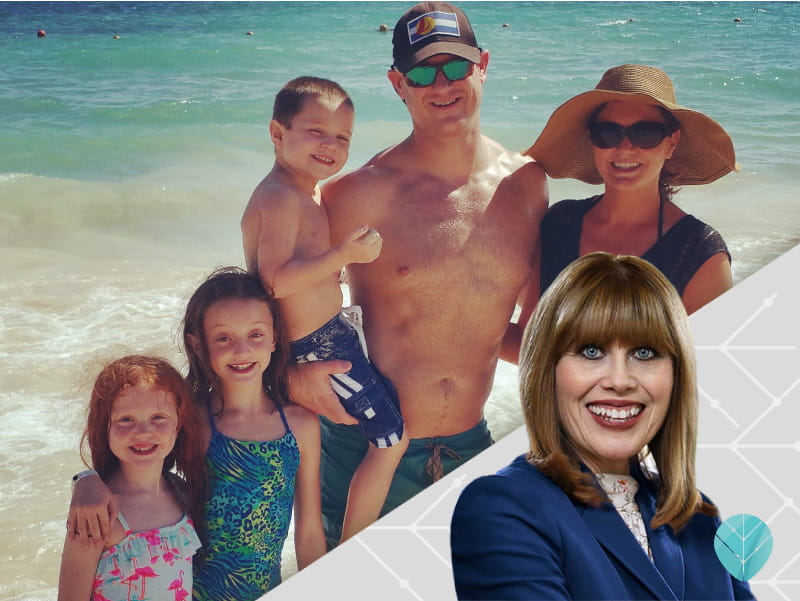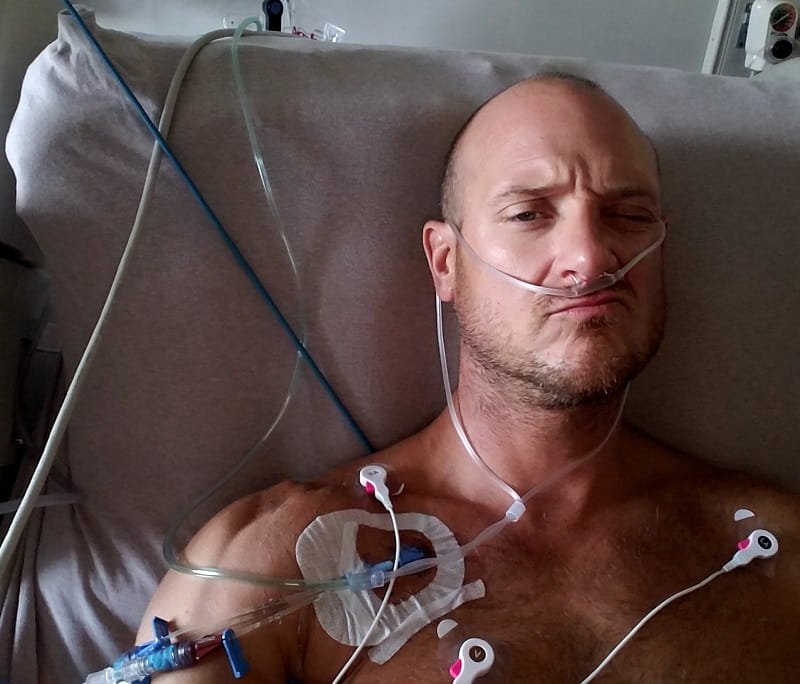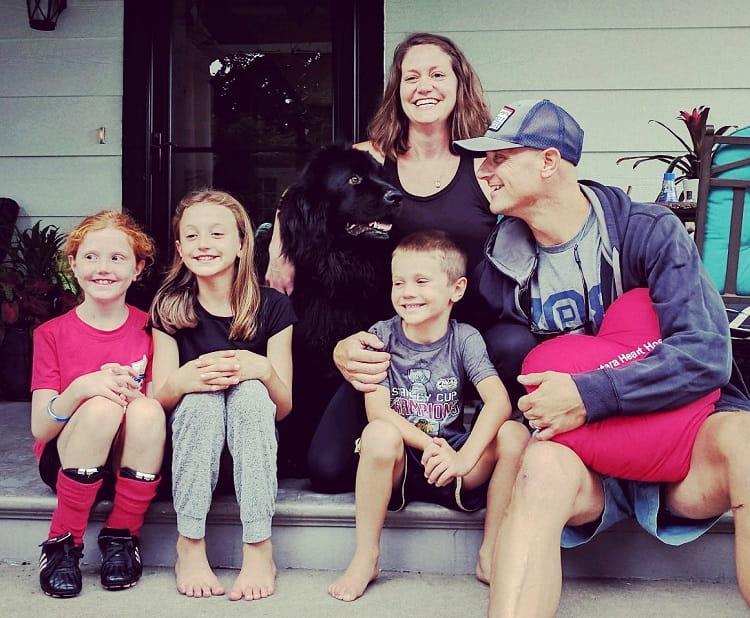His dad's heart stopped suddenly at age 53. His stopped at 42.
By Nancy Brown, American Heart Association CEO

John Hoerster has the same name as his father. He followed him into the same profession, coaching high school football.
And after his dad died of a heart attack at 53, John figured it was a matter of time before his heart gave out.
So John vowed to push that date with destiny as far into the future as possible. He didn’t just diet and exercise. He made fitness such a priority that on July 5 – while his extended family was settling in for a cocktail hour around the pool of the home they’d rented in the Outer Banks, North Carolina – he capped a day of golf and parasailing by heading to the ocean for a swim.
“Make it quick,” his wife, Margaret, said as he headed toward the beach. “The crab feast is at 8.”
A few minutes before 8 p.m., John walked back up the sand to the house, water still dripping off his swimsuit. He passed kids sprawled on picnic tables getting drops to relieve swimmer’s ear and adults nibbling on cheese and crackers. About 10 feet from Margaret, John collapsed. At 42, his heart had stopped, just like his dad’s.
Except for one key difference: His dad’s heart stopped while watering flowers alone in his yard. John’s heart stopped in front of about 30 relatives.

In the brief time it took Margaret to get to him, John’s skin already was turning pale. His eyes were rolling. This strong man always so in control of his body felt lifeless.
“Call 911!” Margaret screamed. “Get the kids out of here!”
Matt Giffhorn, a physical therapist married to one of Margaret’s cousins, reached for a pulse. Feeling none, he started CPR.
Matt pumped John’s chest. Margaret kept his airway clear. Matt’s wife, Christine, was the one who called 911 and remained on the phone with the operator. Margaret kept asking Christine for updates of how close the ambulance was.
The house was so big and so close to the ocean that they never heard the siren. Eight minutes after the call, a rescue crew appeared by the pool. Margaret and Matt moved aside. Paramedics sent a breathing tube down John’s throat and connected him to various machines.
“Open your eyes,” Margaret begged.
John didn’t.

An AED jolted John’s heart, getting it beating again. Barely.
His heart stopped because of cardiac arrest, an outage of the heart’s electricity. He also had a heart attack, the equivalent of a plumbing blockage; oxygen-rich blood wasn’t getting to his heart. It was the same 1-2 punch that felled his dad.
An ambulance took John and Margaret not to a hospital, but to a fire station. The trucks were all pulled out and pointed toward a field, their headlights on, illuminating a makeshift landing spot for a medical helicopter. He needed more care than the locals could provide.
The chopper took off carrying John, but not Margaret. As helpless as she’d felt watching Matt give CPR, this was worse. This time she had to leave John’s side.
John got to the hospital in 20 minutes. Driven by relatives who’d followed the ambulance to the fire station, Margaret’s trip took an hour.
Doctors took John into the catheterization lab, hoping to open any blockages in his arteries with stents. The blockages were too severe and too numerous. His breathing was aided by a ventilator and he was put into an induced coma to help his body heal. They were especially worried about his brain.
“They didn’t know how he’d respond to being without oxygen for so long,” she said.
***
Three days later, it was time to find out.
“I’m here, John,” Margaret said, her hand in John’s as doctors brought him out of the coma.
He squeezed her finger. His toes moved. She was encouraged. Then his right hand began zigzagging the air.
Margaret wasn’t sure what to make of this. Until she realized he was gesturing for a pen and paper.
“Am I OK?” he scribbled.
“Does my mom know?” came next.
Questions followed about her and their kids, 10-year-old Maisie, 8-year-old Claire and Trip, who was 5 at the time.
***
John was revived on a Sunday. That Friday, he underwent a quadruple bypass operation. After all they’d been through, this was “the least scary part,” Margaret said.
Tests soon showed that John’s heart was sound.
His ejection fraction(link opens in new window), a measurement of how strong the heart is pumping, had gone from a drastically low 20 percent pre-surgery to a post-surgery reading of more than 50 percent, into the normal range.
Think about what this really means.
Those four arteries that were now bypassed had been slowly accumulating plaque for years. There were no signs, though, because he was so healthy otherwise.
And because he was so healthy – and so lucky to be surrounded by people who could help, especially Matt – he overcame the trauma.
So now that those damaged arteries are being bypassed, now that he has blood flowing properly into and out of his heart, he’s healthier than he’s been for years.
Or, well, he will be once he recovers from having his chest sawed open and wired shut. That’s the main reason he is coaching the Oak Park-River Forest Huskies from the press box and getting around practices in a golf cart.
“I can’t get hit,” he said.
His stamina and lung capacity are on the mend, too. Avoiding stress is important as well. So in addition to scaling back on coaching, he’s dropped one of the classes he teaches. He’s still teaching an AP junior English class and two others on leadership.
Him coaching the season opener six weeks after nearly taking his last breath is itself a lesson in leadership.
***
John’s story is remarkable in so many ways. He knows this better than most, and not just because his ending is different from his dad’s.
It’s because John was a Chicago firefighter for several years. And while he used CPR “many, many times,” he somberly adds, “Unfortunately, not many were successful.
“That’s the nature of it,” he said. “It’s not like the movies where you give CPR and they pop to life.”
Each year, more than 350,000 people suffer a cardiac arrest outside of a hospital – and at least 315,000 die. Those who receive CPR are two to three more times likely to make it. Yet that happens in less than 50 percent of the cases.
People like Matt make the difference. His efforts during the eight minutes it took for paramedics to arrive changed everything.
“He’s a great example of what happens when training and opportunity come together,” John said.
While Margaret was understandably too overwhelmed to help, she also knows what to do.
Margaret is a senior partner in the Chicago office of Finn Partners, a communications agency where CPR training is often taught. The leader is Gil Bashe, a New York-based managing partner of the company’s Global Health sector. Whenever he visits an office for a meeting, a 90-minute CPR training session follows. (I’m proud to say Gil is also a longtime volunteer for my organization, the American Heart Association.)
Soon, Gil will have help.
“I’m planning to be trained as an instructor, too,” Margaret said.
Everyone should know the basics: If you see an adult or teen collapse, call 911, then push hard and fast in the center of their chest until help arrives, preferably pushing to the beat of the disco song “Stayin’ Alive,” as that happens to provide the perfect timing.

Matt and Christine live near John and Margaret in Oak Park, Illinois.
The couples have always enjoyed dinners and trips together. The guys often play golf together.
None of that will change. But it won’t be the same, either.
“There’s a unique connection,” John said. “Just to see him and share a hug, that’s kind of what it’s about.”
Things are different for John and Margaret, too.
While they’re still a family with two working parents and three children, they’ve climbed off the chaotic treadmill of simply trying to get through each day.
They go for walks. They sit on the porch and talk about all sorts of things. Laundry might not get done and they may be late for some appointments. So?
“We’re just a lot happier with the life we are blessed to have,” Margaret said.
John Hoerster Jr. wasn’t the kind of guy who needed a wakeup call. Remember, after losing his dad while he was 28, he already felt like he was on the clock. Still ...
“Everything tastes a little better: food, job, relationships,” he said. “I loved my wife and kids before but now when I look at them, it’s like another level. I didn’t know there was anything higher than 10, but now it’s like the movie ‘Spinal Tap’ – I want to take it to 11!”
A version of this column also appeared on Thrive Global.
If you have questions or comments about this story, please email [email protected].





